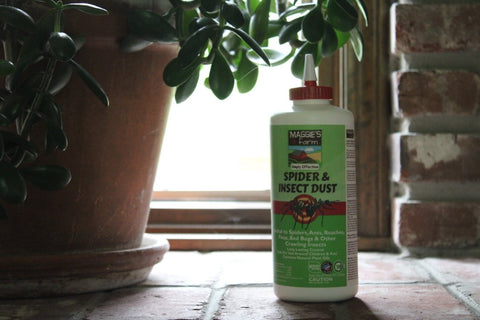Living in a home full of creepy crawly spiders can be unsettling. One way to keep your house free of spiders is using repellents. Knowing what makes a good spider repellent is the key to controlling a spider problem. We’ve gathered information about spider repellents to help you eliminate a spider infestation.
What Makes a Good Spider Repellent?

If you’re battling a spider infestation, it’s important to find an effective solution. Sprays and dusts can help to repel spiders. There are a few things you’ll want to consider when choosing a repellent.
Spider repellents should be:
- Effective: You want to choose a product that will help to prevent pest activity and get rid of an infestation.
- Easy to Apply: Repellents need to be applied in areas where spiders are hiding. This will require applying it in cracks and crevices. It’s important to find a repellent that can be applied with ease.
- Family-Friendly: Finding a product that will take care of your pest problem but not cause problems for your family is important.
Plant-Based Sprays & Dusts

Plant-based sprays and dusts are effective against pests. Though they both can help with your spider problem, sprays and dusts work differently.
Sprays:
- Sprays provide contact kill and residual repellency.
- Sprays are usually applied to bugs. Pests are repelled from surfaces where the spray has been applied.
- Sprays are easy to use.
- Sprays can create a protective barrier that helps to keep pests out of your home.
Dusts:
- Dusts kill pests as they walk through it. The dust attaches to their body, leading to their death.
- Dusts can have residual repellency protection depending on the active ingredients.
- Dusts are usually applied to surfaces and nests.
- Dusts can provide long-lasting protection.
Benefits of Using a Plant-Based Spider & Insect Dust

When choosing a spider repellent, plant-based dusts are a great option. Check out a few benefits that dusts provide.
- Two Layers of Protection: Our Spider & Insect Dust kills spiders and other pests. It also has repellent properties that will help keep spiders away.
- Long-Lasting Control: Dusts can provide longer-lasting control of pests. When undisturbed, dusts remain effective for several months.
- Family-Friendly: Though the plant oils used in our Spider & Insect Dust are effective against pests, they aren’t harmful to people and pets. It is safe for use around children and pets when used as directed.
- Easy to Use: Dust can be applied directly from the puffer bottle. You can also use a paintbrush and a small container of dust to apply along edges and in cracks. You’ll be able to apply the dust to areas where spiders frequent.
Tips for Using a Spider Repellent

Properly applying a spider repellent will help ensure you keep spiders away. Check out a few tips for using our Spider & Insect Dust.
- Apply to areas where spiders have been seen. Common areas include attics, basements, and wall voids. Dust can be applied along baseboards and in cracks and crevices as well.
- To help prevent spiders, apply dust to common entry points around your home.
- A light dusting can get the job done. Apply at a rate of about 2 oz per 100 sq ft.
- Don’t use dusts near baits. You want insects to eat the bait and the repellent properties of the dust will deter these pests.
- Before using a repellent, make sure you have removed potential attractants and hiding places for spiders. This will help to ensure these pests won’t keep bugging you.
Having spiders invade your space isn’t any fun. That’s why it’s important to choose an effective repellent. If spiders are bugging you, we have your back! Check out our Maggie’s Farm Simply Effective™ Pest Control products for a more environmentally and family-friendly solution.
